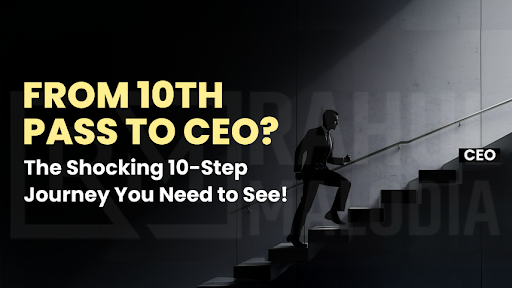
From 10th Pass to CEO? The Shocking 10-Step Journey You Need to See
In India, the moment someone hears you're a 10th pass, the judgment begins. People assume your dreams have a limit. That you’ll spend life doing small jobs, earning just enough to survive, and never rise above mediocrity. Society places invisible walls around your potential, and if you dare to break them, you're called unrealistic.
But what if that so-called “unrealistic” dream is exactly what leads to massive success?
Imagine turning a dropout story into a business empire, because success doesn't need a degree, just determination.
What if being a 10th pass wasn't the end, but the beginning of something extraordinary?
This blog isn’t just another motivational piece. It’s a raw, real, and revealing journey of how ordinary Indians with no fancy degrees transformed their lives and became CEOs, step by step.
Whether you're a young dreamer, a struggling entrepreneur, or someone who’s been told “you’re not educated enough,” this story is for you.
Because success doesn’t speak English or ask for your mark sheet.
It asks for courage. Grit. A growth mindset fueled by curiosity, always learning, always moving forward with purpose.
Are you ready to walk the path from 10th Pass to CEO? Let’s begin.
Myth or Reality in Indian Business?
Most people will laugh at this question. Some will doubt it. Others will dismiss it outright. But what if I told you, yes, it’s absolutely possible? This isn't just talk, it's what actually works in the real world. In towns and villages across India, young boys and girls who once struggled to pass their 10th exams are now running successful businesses, leading teams, and changing lives. Not because they were lucky. They chose to think differently, and that bold choice changed everything.
This is not a story about IQ or English fluency. This is about grit. This is about that burning fire inside every Indian who has ever been told, “You can’t do it.” And if you’re still reading this, maybe you’re one of them.
Let’s begin this journey. One that starts with failure and ends with leadership.
When Society Labels You “Less Educated”
The minute you stop your formal education after the 10th standard, the world changes how it looks at you. Neighbours whisper. Relatives shake their heads. Even friends stop dreaming big with you. You start believing that your ceiling is low. That your life will be spent doing odd jobs or small-time work.
But here’s the truth most people won’t tell you: Education can give you a degree, but it can’t give you vision. School showed you formulas, but never the formula for success in business. But your hunger for success can.
The world is full of people with PhDs who work for CEOs who didn’t even finish college. So what really makes the difference?
Step 1: Turning Pain Into Purpose
Every successful 10th pass entrepreneur started with pain. It could be poverty. Rejection. Family pressure. Or a series of failures that crushed their confidence. But instead of staying in that dark space, they used that pain as fuel.
One young man from Gujarat once said, “Main fail toh ho gaya, par sapne pass ho gaye.” That one line captures it all. Pain, when channelled correctly, becomes purpose. It gives you a clear purpose that makes waking up feel exciting, not exhausting. The reason you don’t quit, even when it’s tough.
Step 2: Starting Small, Thinking Big
Most people want to become CEOs, but they don’t want to start as workers. That’s where many give up. But the real journey from 10th pass to CEO always begins with something very small.
Selling kulfi on a cycle. Running a tiny mobile repair shop. Opening a tea stall outside a bus depot. These aren’t just jobs. They are business lessons in disguise. Every rupee earned teaches you something. Every customer handled gives you insight. Every mistake becomes your business school.
No investor. No MBA. Just raw experience, earned one day at a time.
Step 3: Learning Without Books
Here’s the thing. Just because you didn’t finish school doesn’t mean you stop learning. In fact, real CEOs never stop learning. But they learn differently.
They learn by observing other businessmen. By watching YouTube videos. By attending free seminars. By asking questions at chai stalls. By listening more than speaking.
They don’t memorize theories. They absorb realities. They don’t wait for the perfect coaching class. Each day brings a chance to learn something meaningful and move one step forward on the path to growth.
This is how knowledge grows, even without a degree. Quietly. Relentlessly. And when the moment clicks, the results speak for themselves.
Step 4: Finding the First Success Spark
At some point, something clicks. Maybe your first customer returns with a smile. Maybe your product sells out in a local market. Or maybe you just break even for the first time in months. That small win doesn’t look big to others, but to you, it’s a turning point.
You feel it click inside, I’ve got this. I can actually make it happen.
And from that day, you don’t just work in the business. You start working on the business. You begin to think like an owner. Like a leader. Like someone who is building something bigger than themselves.
That’s when the CEO's mindset begins to form.
Step 5: The Big Identity Shift
There comes a strange moment in every self-made entrepreneur’s life. The moment when someone calls you “sir” or “ma’am” for the first time. You look behind to check if they’re speaking to someone else. But no, it’s you.
This shift is not about ego. It’s about identity.
You’re no longer the 10th fail who was mocked. You’re no longer the “kam padhe likhe” guy. You are now a business owner. A decision-maker. Someone who gets things done.
From that point, the world doesn’t ask what degree you hold. It asks what value you bring. And you answer not with certificates, but with results.
Step 6: Building a Team When You’ve Never Led One
One of the toughest challenges on this path is learning how to lead effectively. How do you lead others when you’ve never worked in a corporate setup? When was you last attended a management class?
Here’s how real CEOs do it: They lead with trust, not titles. They hire people smarter than them. They listen before giving orders. And they build teams like families.
A 10th pass entrepreneur once told his team, “Main aapka boss nahi hoon, main aapka sapna hoon.” That line changed how his team saw him. Lead not just with a title, but with a purpose that drives real impact. That’s leadership. No MBA required.
Step 7: Managing Money Without a Finance Degree
Finance scares people. Especially those who didn’t study beyond school. But real business success isn’t about balance sheets. It’s about habits.
Successful CEOs who didn’t complete school often manage their money better than highly educated founders. Why? Because they respect money. They track every rupee. They don’t overspend. They don’t chase flashy dreams; they focus on sustainable growth.
They learn from failures. They use simple tools. And slowly, they build something rock-solid. Without knowing words like “capital structure” or “operating margin.”
Because you don’t need fancy terms to build financial discipline. You need consistency.
Step 8: Rebranding Yourself in the Market
Once your business grows, you face a new challenge. If you don’t believe in yourself, why should anyone else? Self-respect is where real credibility begins.
This is when rebranding begins. The local chaiwala becomes a “beverage entrepreneur.” The street-side seller becomes a “retail expert.” The man who once fixed phones in a corner shop now runs a chain of service centers.
It’s not about lying or pretending. It’s about seeing yourself with new eyes, and making others see you that way too.
Change your language. Change your appearance. Change your story. And suddenly, your market changes too.
Step 9: Giving Back Like a True CEO
The journey from 10th pass to CEO becomes complete only when you turn around and lift someone else. When you hire young kids who remind you of yourself. When you guide someone who’s just starting out. When you sponsor someone’s education, because you know what it feels like to be left behind.
This is when success feels real. When your story becomes someone else’s reason to try.
At this stage, you’re no longer running a business. You’re creating a legacy.
Step 10: Owning Your Story Without Shame
This is perhaps the most powerful step. The moment you stop hiding your past. When you stop feeling embarrassed about being a school dropout. When you proudly say, “Yes, I studied till 10th. But I learned more in life than any classroom could ever teach me.”
That’s when your story inspires.
Because India doesn’t just need more CEOs. It needs real ones. Leaders who’ve come from the ground, faced fire, and built everything with their bare hands.
You’re not just a businessperson. You’re a symbol of what’s possible.
Why This Is the Perfect Time to Take the Leap
In 2025, with AI taking over jobs, degrees losing their power, and the startup ecosystem booming, there’s no better time to rewrite your destiny. The internet has levelled the playing field. Small towns are birthing giants. Knowledge is just a click away. And what you don’t know today, you can master by tomorrow.
But only if you believe. Only if you start. Only if you keep walking.
So, if you’re sitting with doubts in your heart and a 10th certificate in your drawer, remember this,
It’s not your marks that define you. It’s your mindset.
- becoming a ceo






